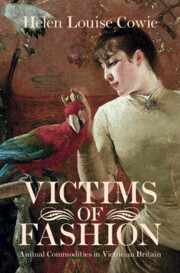
- Publisher:
- Cambridge University Press
- Online publication date:
- October 2021
- Print publication year:
- 2021
- Online ISBN:
- 9781108861267


Animal products were used extensively in nineteenth-century Britain. A middle-class Victorian woman might wear a dress made of alpaca wool, drape herself in a sealskin jacket, brush her hair with a tortoiseshell comb, and sport feathers in her hat. She might entertain her friends by playing a piano with ivory keys or own a parrot or monkey as a living fashion accessory. In this innovative study, Helen Cowie examines the role of these animal-based commodities in Britain in the long nineteenth century and traces their rise and fall in popularity in response to changing tastes, availability, and ethical concerns. Focusing on six popular animal products – feathers, sealskin, ivory, alpaca wool, perfumes, and exotic pets – she considers how animal commodities were sourced and processed, how they were marketed and how they were consumed. She also assesses the ecological impact of nineteenth-century fashion.
‘From civets horribly confined to produce perfume scent to elephants killed for ivory billiard balls and piano keys, Cowie demonstrates how fashion “valued” animals, even while letters to the RSPCA illustrated concern for animal agency and welfare. Contemporary debates surrounding nonhuman animals' victimization are rooted in the human animal's propensity to display.'
Abel Alves - Ball State University
‘This remarkably powerful and elegantly crafted book explores the appeal of animal-based products in Victorian and Edwardian Britain. Taking us deep into the world of trading and consuming bird feathers, seal skins, ivory, and exotic pets, Victims of Fashion brims with historical insight about the consumption of these goods, but also, importantly, their decline in popularity.'
Neil Pemberton - University of Manchester
‘This is a fascinating book from start to finish, written with great verve and clarity. From animal acclimatisation schemes to exotic pet keeping, and from campaigns against animal cruelty and ‘murderous millinery' to the beginnings of international wildlife conservation action, or the hunt to find synthetic substitutes for animal products, it sets some of the key questions of our time in a vivid historical context.'
Sally Shuttleworth - University of Oxford
‘This terrific book exposes how far elites were implicated in systemised animal cruelty (historically associated with the working classes) and illustrates that while women often were pioneering advocates of animal rights, they also constituted core markets for animal commodities.'
Julie-Marie Strange - Durham University
‘Victims of Fashion is a terrific addition to a number of fields, including environmental history, history of technology, commodity studies, and histories of consumer culture. It uses a wide variety of archival sources to address a fascinating and interdisciplinary topic, and the individual chapters would also make excellent, concise reading assignments for students … I would highly recommend this book for scholars in history of science, environmental history, histories of consumption and dress, and any one interested in questions of sustainability in a global context.’
Sarah Pickman Source: H-Environment
'I would highly recommend this book for scholars in history of science, environmental history, histories of consumption and dress, and anyone interested in questions of sustainability in a global context.'
Sarah Pickman Source: H-Environment
 Loading metrics...
Loading metrics...
* Views captured on Cambridge Core between #date#. This data will be updated every 24 hours.
Usage data cannot currently be displayed.